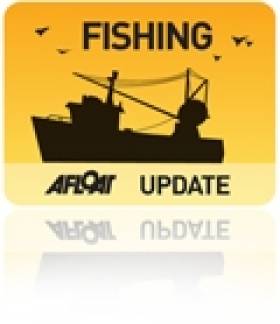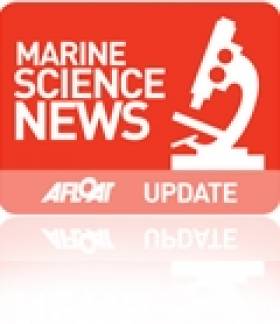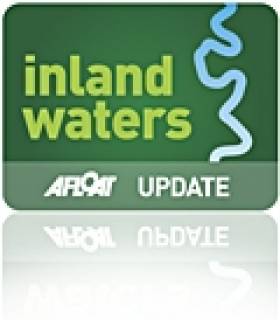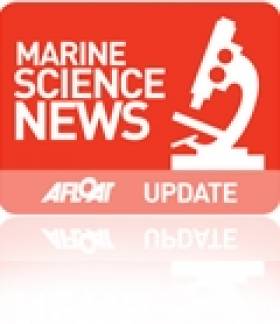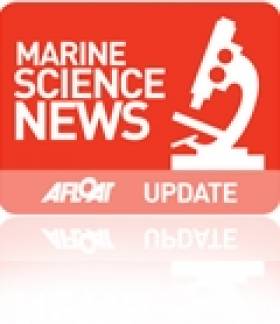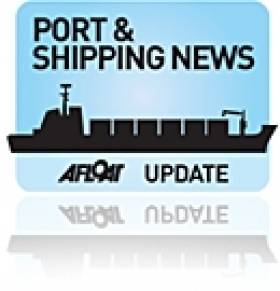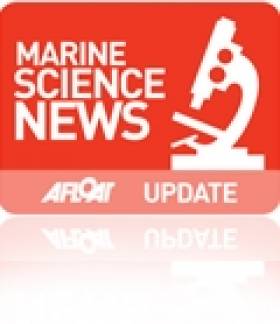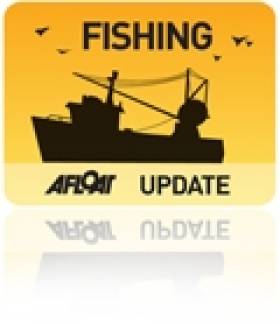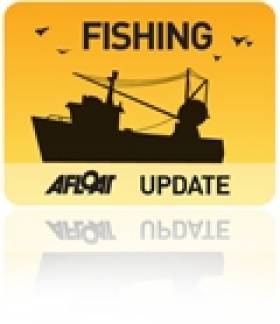Displaying items by tag: Marine Institute
Fishermen Rewarded with Prestigious Marine Stewardship Certificates
Peter Whelan, Chairman of the Sea-Fisheries Protection Authority (SFPA), presented Gavin Power, Chairman of the Celtic Sea Herring Management Advisory Committee (CSHMAC) with the MSC Certification for Polyvalent Mackerel, today at the SFPA's Headquarters in Clonakilty, Co Cork.
Gavin Power of the Irish South and West Fish Producers' Organisation (IS&WFPO) and Chairman of the CSHMAC, said: "We are delighted to receive MSC Certification which is part of a structured approach towards improving the management and added value return from the polyvalent mackerel fishery. Importantly, this certification initiative represents the first such award for the Irish polyvalent sector and would not have been possible without the full support of the SFPA, the Marine Institute, the Department of Agriculture, Fisheries & Food and Bord Iascaigh Mhara.
MSC certification recognises sustainable practices in this important fishery, rewards robust governance, environmentally responsible and sustainable fishing practices and empowers consumers through the use of the label to make the best environmental choice."
Peter Whelan, Chairman of the SFPA said: "The CSHMAC's securing of the MSC's fishery certification program and seafood eco-label is significant as it recognises and rewards sustainable fishing and promotes the best environmental choice in seafood overall. Good governance and management frameworks safeguards jobs, secures fish stocks for the future and help to protect the marine environment. The MSC standard means sustainable fisheries can be recognised and rewarded in the marketplace and gives an assurance to buyers and consumers that their seafood comes from a well-managed and sustainable source."
Minister Smith said "I am delighted to sign today a new Accord on Marine Research between Newfoundland and Labrador and the Irish Authorities. The initiative involves a partnership approach between the Fisheries and Marine Institute of Memorial University of Newfoundland and Ireland's Marine Institute including the charter of the state-of-the-art research vessel 'Celtic Explorer'. Both Institutes have strong capabilities in ocean technology and research. Through this alliance, there is now an opportunity to bring the strengths of both Institutes to greater levels".
Minister of State Connick added that "The proposed EU Atlantic Strategy under the EU Integrated Maritime Policy and the support for a Joint Programming Initiative on Healthy Seas & Oceans recently announced by Ms. Máire Geoghegan-Quinn the European Commissioner for Research, Innovation and Science, highlight the increasing importance of linking the scientific challenges on both sides of the Atlantic."
Welcoming the chartering of the RV Celtic Explorer, Mr Clyde Jackman, Minister for Fisheries and Aquaculture – Newfoundland said "It will enable our academic institutions to take their already world class research to the next level and support a state of the art fishing industry that is based on better science. This initiative will create many new opportunities for young Newfoundlanders and Labradorians, as a result of a more vibrant fishing industry and in conducting fisheries science research".
"Thanks to the support of our Provincial Government, the Marine Institute of Memorial University of Newfoundland is further positioned to play a vital role in the future of fisheries in Newfoundland and Labrador. With the chartering the RV Celtic Explorer and the creation of our new Centre for Fisheries Ecosystem Research the Marine Institute is further positioned to play a vital role in fisheries science research in our province," said Glenn Blackwood, the Executive Director of the Fisheries and Marine Institute of Memorial University of Newfoundland.
"Research lead by personnel from the Centre for Fisheries Ecosystem Research and conducted aboard the RV Celtic Explorer will help develop a better understanding of the state of Newfoundland and Labrador's fish stocks and the dynamics of its marine ecosystems, providing new information to support better decisions." he said.
"The strong alliance the Marine Institute, Ireland has with the Fisheries and Marine Institute of Memorial University of Newfoundland will enable transatlantic collaboration to support the rapidly expanding fisheries research programmes in Newfoundland waters" said Dr Peter Heffernan, CEO of the Marine Institute.
"We are delighted with this opportunity to work with such a prominent team of fisheries scientists and we look forward to exploring with our Newfoundland colleagues how we can also build stronger links as part of a wider international ocean observation initiative to study the Gulf Stream and North Atlantic Drift. This could link SMART technology to monitor climate change and environmental conditions in both Irish and Newfoundland waters and stimulate commercial spin off opportunities."
"Projects linking technologies, equipment and expertise on both sides of the Atlantic would therefore enhance Ireland and Newfoundland's capability to perform in the forefront of scientific endeavours as our strategic geographic location demands," he further added.
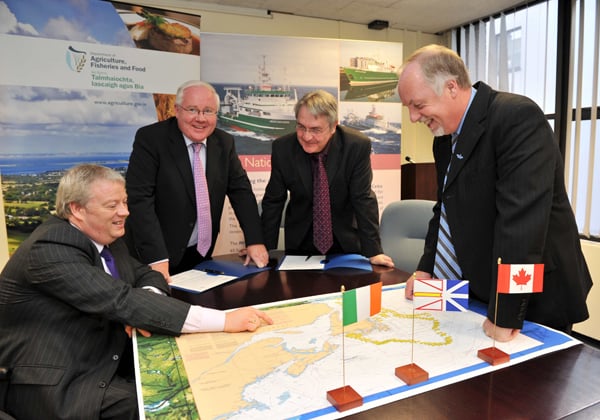
Brendan Smith TD, Minister for Agriculture, Fisheries and Food and Sean Connick TD, Minister of State at the Department of Agriculture, Fisheries and Food signing an accord with their Newfoundland counterparts Minister Clyde Jackman and Deputy Minister Alastair O’Reilly In Agriculture House.
New Climate Model Will Chart Climate Change on Mayo Rivers
Launching the publication of the final report on RESCALE project, Minister Smith said that the project was a major milestone in our understanding of the effects of climate change on sensitive upland catchments in the west of Ireland. "While global climate change is a worldwide phenomenon, the research findings in this report provide information at the local level that will be invaluable to fisheries and land use managers," said the Minister. "Practical research work such as RESCALE is essential if we are to plan for the future management of our valuable agriculture, fisheries and forestry resources in the west of Ireland."
The project is studying data from an unbroken record of information on water temperature, air temperature, river discharge, rainfall and a host of other factors which exists for the catchment dating back to the 1950s for the Burrishoole river. This information collected at the Furnace facility and the neighbouring Met Eireann synoptic station, is invaluable as a resource, not only for measuring physical change over the past sixty years, but also as a proven yardstick to "ground-truth" any computer-generated models describing the likely effects of global warming. Minister Smith said "I am very impressed with the work being done here in Newport and the high level of collaboration between the Institute and the Universities on marine research and its practical application to real situations to help inform decision making into the future."
Europe Seeks Public Input on Atlantic Ocean
The European Commission invites on-line public input to explore how the Integrated Maritime Policy (IMP: 2007) could be implemented in the European Atlantic Area.
In the context of the IMP-2007, the Commission is developing strategic approaches to Regional Sea Basins where there is a demand and a perspective of clear value added. Regional (Sea Basin) Strategies have been completed for the Baltic Sea, the Arctic, the Mediterranean and are at a planning stage for the North Sea.
The Commission now invites interested parties in the Atlantic region to input to the development of an Atlantic Strategy.
Such a Strategy would define common priorities; improve regional governance; identify opportunities for smart economic growth and for clustering, synergies and economics of scale. A Regional Strategy would also better focus future European Funding Programmes (e.g. Structural, Regional, Research, Innovation & Competitiveness, etc).
Target Groups: Member States, regional and local authorities, inter-governmental and non-governmental bodies, public organisations, enterprises, civil society and the general public
Contributions may be submitted by using an online questionnaire.
http://ec.europa.eu/fisheries/partners/consultations/atlantic_ocean/index_en.htm
State Research Body Backs Call for Marine Protected Areas
Speaking from the launch of the report in Bergen, Norway, Minister of State with responsibility for Sustainable Transport, Horticulture, Planning and Heritage, Mr. Ciaran Cuffe T.D. said that Ireland welcomed this evidence-based assessment of the marine environment as a 'major milestone.'
"Such periodic holistic assessments are essential 'barometers' allowing policy makers to gauge overall progress towards sustainable management and identify those actions essential to deliver clean, diverse, healthy and productive seas around us," said Minister Cuffe. "Such actions are critical to maintaining our seas and oceans as a sustainable resource for this and future generations."
According to the Report, climate change and ocean acidification effects are now evident especially in the northern OSPAR areas. In addition, human uses of the marine environment, such as offshore renewable energy, offshore oil and gas production, mineral extraction and shipping, are increasing and must be managed in a coordinated way, backed up by research on impacts, if environmental damage is to be avoided.
Furthermore, the decline in biodiversity is far from being halted and actions, such as extending the network of offshore Marine Protected Areas (MPAs), are required to improve the protection of threatened and/or declining species and habitats. In December 2009 Ireland designated 19 MPAs including 4 offshore MPAs.
However, the Report states that there has been progress in reducing pollution from nutrients, certain hazardous substances and radioactive substances in our oceans and seas, although continued efforts are needed. In addition, there have been improvements in fisheries management, although fishing activities continue to have large impacts on marine ecosystems in the seas around Ireland.
"The Marine Institute is delighted to have participated closely in the development and production of this assessment by acting as the focal point for Irish involvement in the process and by providing data and scientific input," said Dr. Peter Heffernan, CEO of the Marine Institute. The QSR 2010 Report is a product of cooperation between many experts from 15 OSPAR countries. The Department of Environment, Health and Local Government act as Head of Delegation for Ireland to OSPAR.
Irish Marine Researchers Invited to Comment on European Marine Research
Irish marine researchers (including SMEs) are invited to comment and / or give input to future European Marine Research Strategy via the draft Ostend Declaration.
The EurOCEAN 2010 Ostend Declaration will be a key deliverable of the Belgian-EU Presidency EurOCEAN 2010 Conference (Ostend 12th – 13th October). The Ostend Declaration, following the success of the Galway Declaration (2004) and the Aberdeen Declaration (2007), is intended to highlight the importance of marine and maritime science and technology for our economies and societies and to identify the high level governance structures, support mechanisms and research infrastructures necessary to ensure that critical research challenges in the next decade are properly addressed at national and European level.
In consultation with key European marine and maritime science stakeholder organisations and networks, a drafting group has prepared a draft Ostend Declaration which will be open for consultation until 4th October 2010. The Declaration aims to raise the profile of marine science and technology in Europe and needs your support.
The draft Ostend Declaration will be presented and discussed for approval at the EurOCEAN 2010 Conference on 12th – 13th October 2010 (www.eurocean2010.eu) which will be attended by Commissioner Damanaki (DG MARE) and Commissioner Geoghegan-Quinn (DG Research).
Irish Shipping Trade Volumes Return to Growth
The midyear data in particular points towards trade volume growth in three of the principal freight segments; most significantly in lift-on/ lift-off (lo/lo) export trades which we estimate grew by 5%. Roll-on/Roll-off export traffic was also up 5% per cent on an all island basis. Dry bulk volumes through ROI ports increased by 15% for the first six months compared to the same period last year. Shipments in April this year saw the strongest monthly volume of bulk cargoes in over 2 years.
Roll-on/roll-off (ro/ro) traffic on an all-Island basis continued to make a steady recovery with an increase of 2%, up to 771,585units for the first half of 2010. The ro/ro segment is largely weighted towards services to and from the UK which remains our largest trading partner.
The most significant change in volume has been in the main lo/lo trades. Overall total volume including export and imports fell only marginally by 1% to June with 517,552 units being handled. However this compares to a -24% reduction for the same periods last year.
A key factor in the positive upward movement has been the continued strong performance of export volumes which as noted was up 5% year on year. Import volumes were down 2% which is largely as a result of continued weak domestic demand. Nonetheless the rate of decline in import volumes has eased sharply which is possibly also offset by demand for industrial imports used as inputs for the merchandise export trades.
The sharp fall in import units over the last 24 months has inversely created a problem for export companies as there is now reduced supply of export quality containers available in Ireland. As a result shipping lines have to reposition empty containers from the UK and Continent which in turn adds to the overall cost of the export box.
Dry bulk (Bulk carrier) trades recovered some of the record volume losses seen in 2009 with a strong 15% increase between January and June. Part of this recovery is attributed to stronger domestic demand for grains, fertilizers and other agricultural products, while improved global demand for steel and other ore aggregates also pushed up volume throughput.
Breakbulk volumes through ROI ports linked to construction inventories such as steel and timber continued to decline by 11%, which is half the recorded figure for 2009. Nonetheless volume activity in this segment remains at a historically low level.
Liquid bulk (Tanker) volumes such as oil fell by 4%, with lower transshipment storage for the US market and other seasonal factors impacting on demand. The outlook for continued short term volume recovery remains largely contingent on the external recovery in the global economy.
Students Take to the High Seas
Imagine being able to plan, design and carry out your own scientific survey into the seas around us. Last week research students from across Europe were given just such an opportunity when they joined scientists onboard the Irish national research vessel RV Celtic Voyager in waters off Cork.
This unique opportunity for students to gain practical experience in carrying out multidisciplinary marine scientific research is part of the European Framework 7 project EUROFLEETS, and was designed, developed and co-funded by the Marine Institute, Ireland.
Over the course of six days, between the 14th and 19th August, 20 European postgraduate students learned the skills necessary to map the seabed, identify the animals and plants living there, and investigate the local and oceanic currents that influence them. Training focused specifically on operational research and included the deployment of equipment and instrumentation, sample recovery and processing, and data acquisition. Other modules investigated designing and planning a survey, operations and capabilities of research vessels and safety at sea.
Former Obama Adviser sees a "Rebirth" in the Use of Industry Information to Guide Scientists
Dr. Peter Heffernan (Marine Institute) with Martin Pastoors (IMARES, The Netherlands) and Dr. Steve Murawski (NOAA, USA) at the Conference. (Photo: Marine Institute).
The Conference - "Fisheries Independent Information, Galway 2010" – not only explores how information gathered at sea by fishermen can better contribute to fish stock assessments, management and policy but critically, how the vast amount of experience and traditional knowledge accumulated by the fishing industry can be harnessed in sustainable management strategies.
Speaking on the first day of the event Dr. Steve Morawski, former senior advisor for the National Oceanic and Atmospheric Administration to President Obama's Ocean Policy Task Force and the current Chief Science Advisor to NOAA Fisheries, USA said that in spite of past concerns regarding the reliability of fishery-dependent data, we are in the midst of a "rebirth" in the use of information from industry to inform stock assessment and the management of catch and by-catch allowances.
"Fortunately, great advances have been made in methods for collection and analysis of fishery-dependent data and we have experienced encouraging success in working with stakeholders to collect this type of data," he said.
Some 30 countries from across the globe are represented at the conference, which features 81 oral presentations and 50 poster displays covering the entire spectrum of fishing, from small scale artisinal fisheries right up to large scale industrial operations engaged across the world's oceans and inland waters.
Opening the conference, Dr. Peter Heffernan of the Marine Institute said that, while Ireland had made significant progress in bringing scientists and fishers together through the formation of the Irish Fisheries Science Partnership, he was keen to learn how such initiatives had worked elsewhere and what we could learn from others. "Innovation is the key element to this conference," he said, "technical innovation in the development of new data collection tools and data integration, but also through innovative thinking and co-operation in how we can marry together traditional and non-traditional information."
According to the International Labour Organisation (ILO) the capture fishing industry employs some 27 million people worldwide (including full-time, part-time and occasional fishers). In Europe, the European Commission estimates that some 141,000 people are employed in the fishing sector which produces over 6.5 million tonnes of fish between the catching and aquaculture industries.
"Fishermen and scientists have an enormous amount that they can contribute to each other," said Lorcan O'Cinneide, CEO of the Irish Fish Producers Organisation in his keynote address earlier today (Tuesday 24th August). "It is essential for the future that the integration of such information can be brought to the centre of the scientific and advice process in a manner that has the necessary rigour to be credible and useful to analysis."
Marine and inland fisheries are of particular importance to developing countries where ILO estimates that over 94% of the world's fishers live (Asia 83%, Africa 9% and South America 2.5%). In these countries fish is not only an important source of protein for many communities, but also an important part of global trade. The role that fishers and their knowledge play in ensuring a sustainable "ecosystem approach" to commercial fishing by artisinal and small-scale fishworkers the world over will be discussed during the last day of the Conference (Thursday 26th) by Sebastian Mathew of the International Collective in Support of Fishworkers (ICSF).
The conclusion of his paper will suggest that sustainability in fisheries depends upon seeking common ground between fisheries policy, scientific knowledge and fishers' knowledge and practice. He will also suggest that the key to sustainable fisheries management lies in treating fishers' knowledge with respect and by promoting active communication amongst stakeholders.
Unique Fisheries Conference Set for Galway
A unique conference - aimed at making the most of fisheries information collected from commercial fishing vessels and fishermen themselves – will take place later this month in Galway between the 23rd and 26th August.
The conference will be hosted by the Marine Institute and is being convened by Norman Graham (Marine Institute, Ireland), Richard Grainger (Fisheries and Agriculture Organisation - FAO), William Karp (Alaskan Fisheries Center – NOAA, USA) and Kjell Nedreass (Institute of Marine Research, Norway).
It will also feature a number of well known speakers from the fishing industry including Lorcan O'Cinneide of the Irish Fish Producers Organisation, Gavin Power of the Irish South and West Fish Producers Organisation, and Barry Dees from the National Federation of Fishermen's Organisations, UK.
The theme of the conference will be to find ways of harnessing the information from commercial fisheries and observations made by fishermen so as to improve scientific advice and management of marine resources, As Norman Graham observes, "every time a fisherman puts his net in the water, he's not only catching fish, he's taking a scientific sample as well."


























